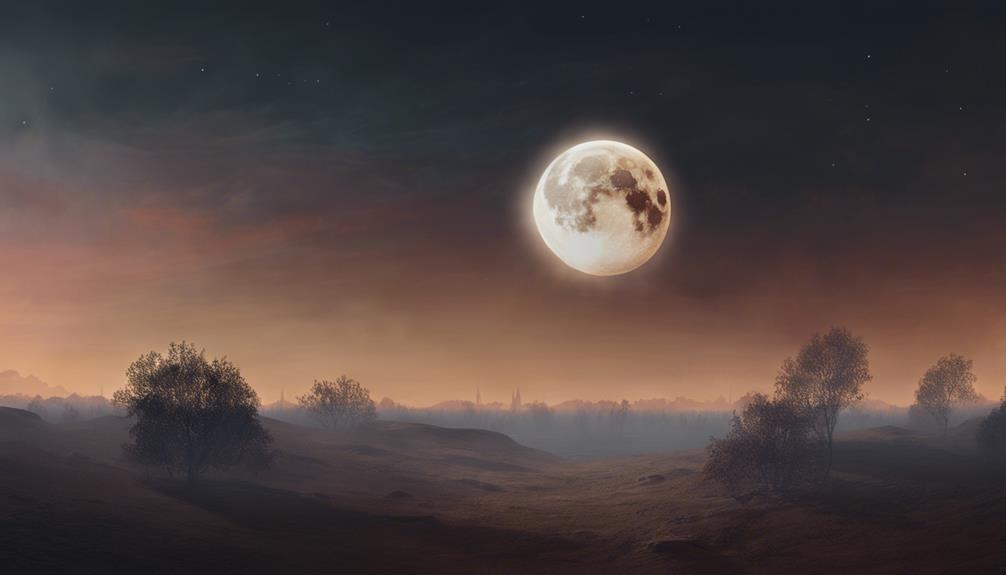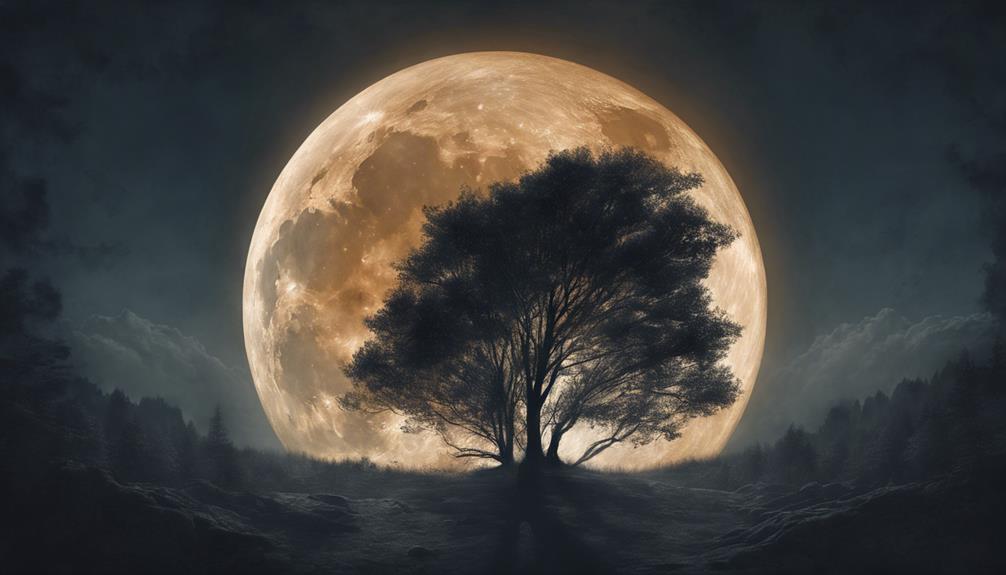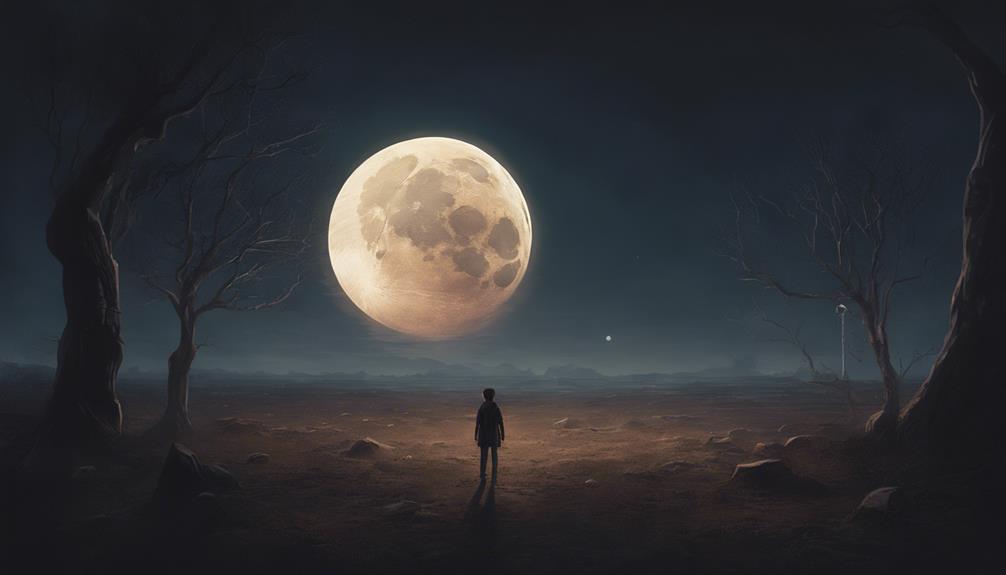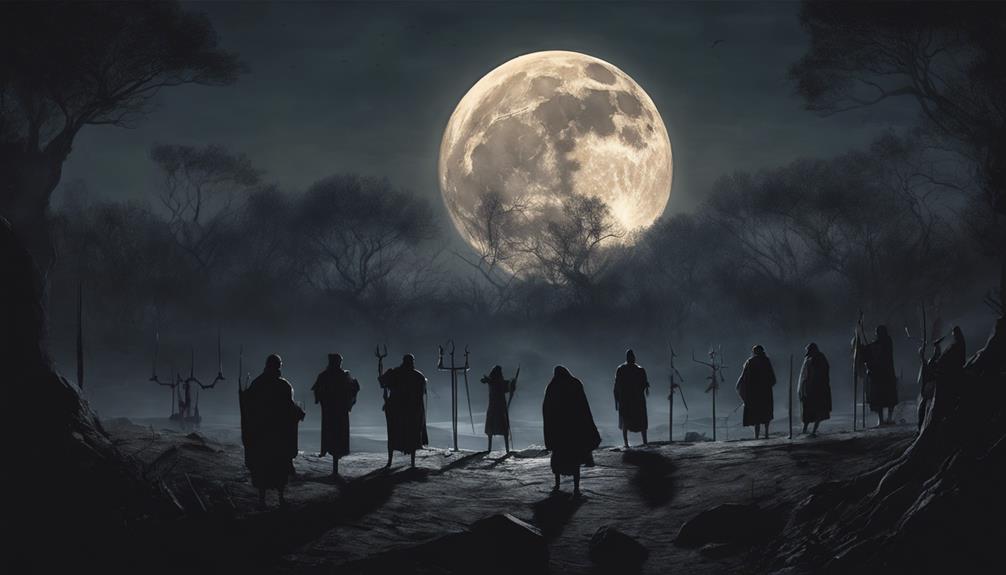What Is a Lunar Eclipse? Emotions and Endings

A lunar eclipse is a celestial event where the moon passes into the Earth's shadow, causing it to dim and appear reddish. This phenomenon has fascinated people for centuries and is a blend of science and folklore.
It can evoke deep emotions and symbolize endings and new beginnings in our lives. The significance lies in how it connects us to the larger cosmic narrative.
Key Takeaways
- Lunar eclipses symbolize emotional release and transitions.
- Cultural beliefs and rituals surround lunar eclipses globally.
- Astrologically, lunar eclipses prompt self-discovery and changes.
- Studying lunar eclipses enhances understanding of celestial alignments.
The Science Behind Lunar Eclipses
During a lunar eclipse, Earth passes between the sun and the moon, casting a shadow on the moon's surface. This celestial phenomenon occurs when the three celestial bodies – the sun, Earth, and moon – are perfectly aligned. Lunar eclipses are a result of the moon's orbital path intersecting with Earth's orbital plane around the sun. The occurrence of lunar eclipses is tied to lunar cycles, specifically the full moon phase, where the moon is directly opposite the sun.
Astronomical events like lunar eclipses provide a unique opportunity to observe the movement of celestial bodies and understand the mechanics of our solar system. The shadow that Earth casts on the moon during a lunar eclipse is known as the lunar shadow. This shadow can be partial or complete, depending on the alignment of the sun, Earth, and moon. Studying lunar eclipses not only enriches our understanding of the cosmos but also serves as a reminder of the beauty and complexity of the universe we inhabit.
Types of Lunar Eclipses
Types of lunar eclipses vary based on the position of the Earth, moon, and sun in relation to each other. Lunar eclipse phases include penumbral, partial, and total eclipses, each occurring depending on the alignment of the three celestial bodies. Eclipse frequency is influenced by the orbit of the moon around the Earth and its tilt concerning the sun, resulting in varying numbers of lunar eclipses each year.
- Penumbral Lunar Eclipse: This type occurs when the moon passes through Earth's penumbral shadow, causing a subtle darkening of the moon.
- Partial Lunar Eclipse: During a partial lunar eclipse, only a portion of the moon enters Earth's umbral shadow, leading to a partial darkening of the lunar surface.
- Total Lunar Eclipse: In a total lunar eclipse, the moon passes entirely into Earth's umbral shadow, resulting in a striking reddish appearance known as the 'blood moon.'
- Rare Hybrid Lunar Eclipse: This unique type combines elements of both total and annular eclipses, creating a captivating celestial event.
Historical and Cultural Significance

Historical and cultural significance of lunar eclipses encompasses a wide array of themes, including symbolism in various cultures, rituals, and practices associated with these celestial events.
Folklore and legends often attribute mystical or supernatural powers to lunar eclipses, shaping traditions and beliefs that have been passed down through generations.
Exploring these aspects reveals the profound impact that lunar eclipses have had on human societies throughout history.
Symbolism in Cultures
Symbolism in various cultures surrounding lunar eclipses reveals deep-rooted beliefs and traditions that have been passed down through generations.
- In Ancient Mesopotamia: Lunar eclipses were seen as omens or warnings from the gods, signaling potential upheavals or shifts in power.
- Among the Maya Civilization: Lunar eclipses were linked to their gods, particularly the jaguar deity, with the belief that the gods were consuming the moon.
- In Chinese Culture: Lunar eclipses were associated with the idea of a celestial dragon devouring the moon, leading to rituals and loud noises to drive the dragon away.
- In Hindu Tradition: Lunar eclipses were viewed as inauspicious times, with the belief that negative energies are heightened, leading to practices like fasting and purification rituals.
Rituals and Practices
The historical and cultural significance of rituals and practices surrounding lunar eclipses reflects a deep connection between celestial events and human behavior across different societies. Personal rituals and spiritual practices have been integral parts of human interaction with lunar eclipses throughout history. These practices vary widely, from simple observations to elaborate ceremonies. Here is a table showcasing examples of such rituals and practices:
| Cultural Tradition | Type of Practice | Purpose |
|---|---|---|
| Ancient Mayan | Bloodletting rituals | Appease the gods and ensure the sun's return |
| Chinese | Dragon dances | Scare away the dragon causing the eclipse |
| Hindu | Chanting mantras | Ward off evil spirits during the eclipse |
These rituals and practices highlight the diversity and richness of human responses to celestial phenomena.
Folklore and Legends
Within various cultures worldwide, folklore and legends surrounding lunar eclipses have been passed down through generations, shaping beliefs and practices tied to these celestial events.
- Folklore interpretations: Different cultures have unique stories explaining the lunar eclipse phenomenon, often attributing it to mythical creatures or gods.
- Modern beliefs: Today, some people still hold onto traditional beliefs about lunar eclipses impacting fertility, luck, or even predicting disasters.
- Superstitions: Many superstitions exist around lunar eclipses, such as avoiding certain activities or behaviors during the event to ward off bad luck.
- Celestial myths: The moon's disappearance during a lunar eclipse has sparked various celestial myths about battles between light and dark forces or the moon being devoured by a mythical creature.
Lunar Eclipses and Astrology

When considering lunar eclipses in astrology, it is essential to examine the alignment of celestial bodies and their potential influences on human behavior and events. Astrology insights suggest that lunar eclipses are times of significant emotional release and change. During these celestial events, the alignment of the sun, moon, and earth creates a powerful energetic shift that can impact individuals differently based on their astrological signs.
To gain a deeper understanding, let's explore the potential effects of lunar eclipses based on the zodiac signs:
| Zodiac Sign | Potential Effects |
|---|---|
| Aries | Increased energy and drive |
| Taurus | Focus on stability and security |
| Gemini | Heightened communication skills |
| Cancer | Emotional intensity |
Each zodiac sign may experience the influence of a lunar eclipse uniquely, leading to a range of emotional responses and outcomes. By considering these astrological insights, individuals can prepare themselves for the potential emotional release and transformative energies that accompany lunar eclipses.
Emotional Impact of Lunar Eclipses
During a lunar eclipse, individuals may experience heightened emotional responses due to the alignment of celestial bodies and their energetic influences. This phenomenon can lead to a range of emotional experiences that may impact personal growth and inner exploration. Some key emotional impacts of lunar eclipses include:
- Emotional release: Lunar eclipses often bring suppressed emotions to the surface, allowing individuals to release pent-up feelings and find catharsis.
- Healing: The intense energy of a lunar eclipse can act as a catalyst for emotional healing, enabling individuals to address past traumas and wounds.
- Self-reflection: The reflective nature of lunar eclipses encourages introspection and self-examination, prompting individuals to delve into their emotions and thought patterns.
- Growth: Through the emotional intensity of a lunar eclipse, individuals have the opportunity for profound personal growth and transformation, fostering a deeper understanding of themselves and their emotional landscape.
These emotional responses are essential aspects of the lunar eclipse experience, providing valuable opportunities for individuals to engage in self-discovery and emotional evolution.
Endings and New Beginnings

A lunar eclipse marks not just the end of a celestial event but symbolizes transitions in life, ushering in new beginnings.
As the shadow of the Earth covers the moon, it signifies closure and the opportunity for fresh starts.
This astronomical occurrence encourages individuals to embrace change, moving beyond endings towards the promise of new chapters.
Transitioning From Endings
Transitioning from one phase to another is a natural process that signifies both endings and new beginnings in various aspects of life. During this period of change, individuals may experience a mix of emotions as they navigate through endings and prepare for fresh starts. This transition phase is crucial for emotional healing and personal growth.
To better understand this process, consider the following:
- Reflecting on past experiences can aid in closure and acceptance.
- Embracing uncertainty allows for new opportunities to emerge.
- Seeking support from loved ones can provide comfort and guidance.
- Setting intentions for the future helps in navigating the transition with purpose and direction.
Embracing Fresh Starts
To fully embrace fresh starts and navigate endings and new beginnings effectively, individuals must actively engage in self-reflection and intentional goal-setting. Personal growth and self-reflection are essential components of this process. By taking the time to analyze past experiences and understand personal strengths and weaknesses, individuals can set the stage for transformation and empowerment.
Setting specific and achievable goals is equally crucial, as it provides a roadmap for progress and success. Embracing fresh starts requires a willingness to let go of the past and move forward with purpose and determination. Through self-reflection and goal-setting, individuals can cultivate a mindset that's open to change and growth, ultimately paving the way for a new chapter filled with opportunities and possibilities.
Moving Beyond Closure
Embracing fresh starts involves not only reflecting on past experiences and setting goals, but also entails the crucial step of moving beyond closure towards new beginnings with purpose and determination. The healing process of letting go and moving forward is essential for personal growth and transformation.
To truly embrace new beginnings, individuals must confront their emotions, accept endings, and open themselves up to the possibilities of what lies ahead. Here are four key ways to facilitate this transition:
- Practicing self-care and mindfulness to nurture inner peace.
- Engaging in activities that bring joy and spark creativity.
- Seeking support from loved ones or a trusted therapist.
- Setting realistic goals and taking consistent steps towards them.
Rituals and Practices

Throughout various cultures and traditions, rituals and practices surrounding lunar eclipses have been meticulously observed and documented for centuries. These practices often revolve around the idea of harnessing the unique energy of the eclipse to manifest intentions or release negative energies. Here is a table summarizing common rituals and practices associated with lunar eclipses:
| Rituals and Practices | Description | Purpose |
|---|---|---|
| Personal Rituals | Individualized actions such as meditation or journaling | Facilitate healing and self-reflection |
| Spiritual Practices | Ceremonies, prayers, or connecting with nature | Deepen spiritual connection and insight |
| Lunar Gazing | Observing the eclipse with intention and focus | Absorb lunar energy and enhance intuition |
These rituals and practices are often seen as powerful tools for personal growth, spiritual development, and emotional healing. By engaging in these activities during a lunar eclipse, individuals seek to align themselves with the cosmic energies at play and harness them for positive transformation and connection.
Harnessing Lunar Eclipse Energy
Harnessing the energy of a lunar eclipse involves strategically aligning oneself with the celestial forces at play to amplify intentions and manifest desired outcomes. During this potent period, individuals can tap into the unique energy of the lunar eclipse to facilitate personal growth and transformation. Here are some ways to harness this energy effectively:
- Set Intentions: Clearly define your goals and desires, focusing on what you want to manifest or release during this powerful time.
- Embrace Emotional Release: Allow yourself to let go of any pent-up emotions or negative energies, creating space for new opportunities and growth.
- Meditate and Reflect: Take time to meditate and reflect on your intentions, connecting with your inner self and the energy of the eclipse.
- Engage in Rituals: Perform rituals or practices that resonate with you, such as lighting candles, journaling, or spending time in nature, to amplify the energy and focus of the eclipse.
Frequently Asked Questions
Can a Lunar Eclipse Have a Physical Impact on Our Bodies?
Despite common beliefs, a lunar eclipse generally does not cause physical symptoms in humans. While some people may report changes in energy levels or mood during this celestial event, scientific evidence for direct physical impacts remains inconclusive.
How Do Different Cultures Around the World Interpret Lunar Eclipses?
Different cultures worldwide hold diverse interpretations of lunar eclipses. Cultural beliefs shape ritual practices and ceremonies during these celestial events. These ancient traditions highlight the rich tapestry of human understanding and connection to the cosmos.
Are There Any Superstitions or Myths Associated With Lunar Eclipses?
Many cultural beliefs and astrological interpretations consider lunar eclipses as significant events. Folklore often attributes spiritual meanings to these celestial occurrences, invoking a sense of wonder and mystery among those who observe them.
Can a Lunar Eclipse Affect Our Relationships or Social Interactions?
Relationship dynamics can be influenced by a lunar eclipse. Emotional connections may intensify or face challenges during this time. While some may feel more connected, others might experience tension, highlighting the impact of celestial events on social interactions.
Is It Possible to Predict When the Next Lunar Eclipse Will Occur?
Astronomers predict celestial phenomena like lunar eclipses by calculating the timing of astronomical events. Through advanced forecasting methods, they can determine when the next lunar eclipse will occur, providing valuable insights into these captivating natural occurrences.











